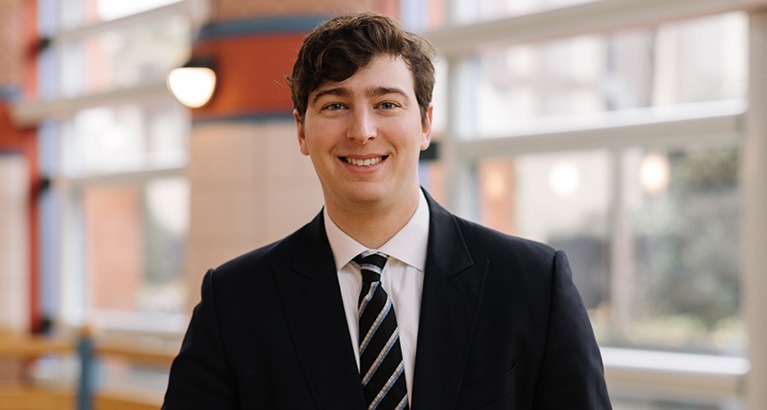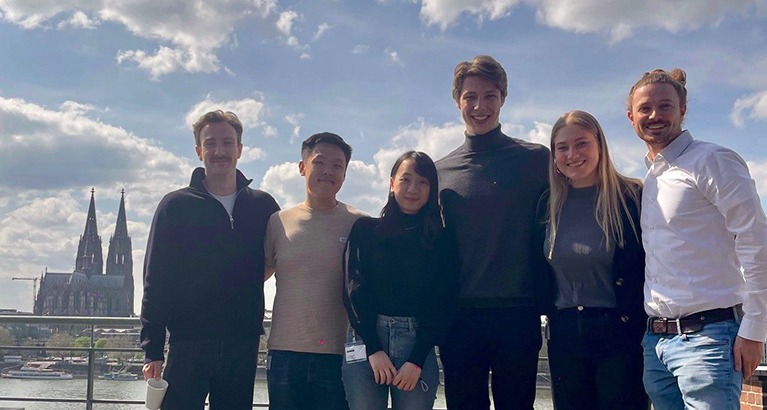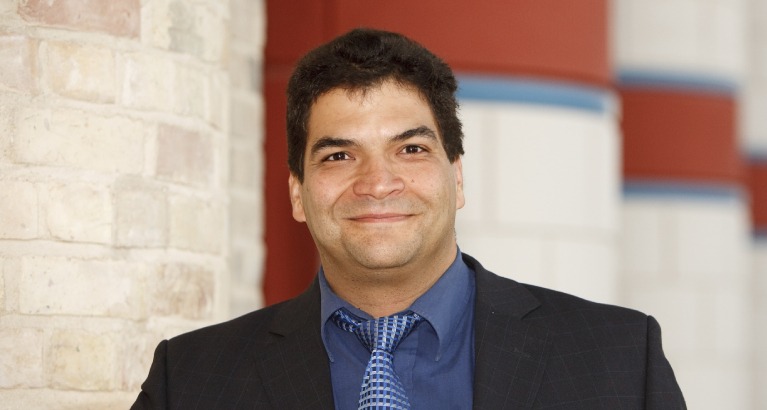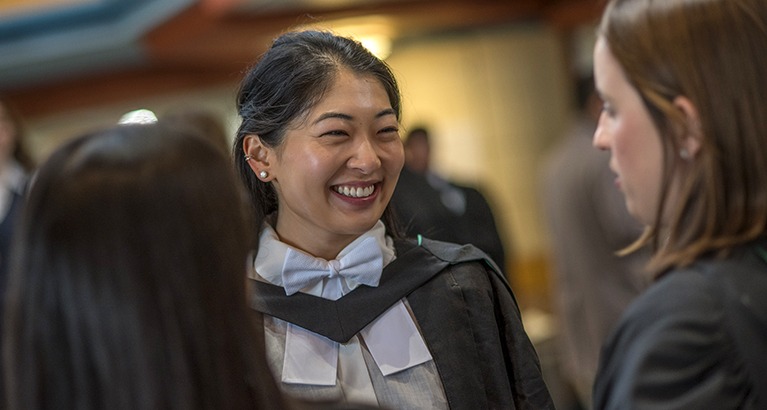Cambridge Judge alumnus Tate Lavitt, now Senior Global Product Line Manager at Corning Life Sciences, was shortlisted and received an ‘Honourable Mention’ in the prestigious Cambridge-McKinsey Risk Prize in 2021, during his MBA year. Hosted by the Centre for Risk Studies at Cambridge Judge Business School, Tate’s submission focused on how green project bonds in the developing world might reduce risk in the carbon credit sector overall.
Q&A with alumnus Tate Lavitt, Senior Global Product Line Manager at Corning Life Sciences
What does your current role involve, and what were you doing prior to the MBA?
I’m currently Senior Global Product Line Manager of the serum team for Corning Life Sciences, which involves managing a small team that handles the P&L (profit and loss) of animal serums for Corning. I grew up in the USA and was a top sales performer at my previous company, but there wasn’t much room for growth in the management area. I knew I wanted to continue study in biology, so I began an MPhil at Cambridge before joining the MBA the following year.
Why did you choose Cambridge?
I was drawn to Cambridge for several reasons, including the opportunity to meet students from many different subject areas in the college system. I wanted to experience living in another country while gaining management experience at one of the best universities on the planet. I succeeded in this and more.
How did the MBA help you to pivot?
The MBA allowed me to pivot to product management and take a larger P&L management role. I was also internally nominated at Corning for LEAD, a 4-year rotational leadership development programme, and I credit the MBA at Cambridge Judge with helping me to get this nomination.
How did you benefit from the collegiate system?
Cambridge Judge really stands out from other business schools because of the wider university and collegiate system. Being a member of a college (Peterhouse) gave me the unique opportunity to meet students from so many different subject areas. At the MCR (the post-graduate common room) there were often planned talks, events and debates. We also had formal dinners in hall, which were a nice opportunity to interact with the post-graduate community.
Peterhouse was generous in supporting my sports activities, including my time as the captain of the polo team, which I earnt a full ‘Blue’ for. That team and my time at Peterhouse have led to friends I will have for the rest of my life, including my partner who is finishing her PhD in law at Peterhouse in December.
What opportunities were there to home in on sustainability at Cambridge?
The Cambridge MBA itself is inherently multidisciplinary in a way that many other MBAs aren’t. There are multiple groups that work on sustainability. The Cambridge Centre for Environment, Energy and Natural Resource Governance (CEENRG) and the Conservation Research Institute (CRI) are front of mind for my interests. I found the University of Cambridge faculty open to working together, and there were plenty of opportunities to explore sustainability across the programme from School-wide Special Interest Groups (SIGs) to sustainability-focused MBA Electives.
How did you tailor the MBA to suit your career aspirations and interests?
I chose the Healthcare Concentration, which was phenomenal, with leading industry experts who were on a first-name basis with the faculty and our cohort. I worked on a Global Consulting Project (GCP) at Roche in innovation and strategy for digital health, and undertook a summer internship at QIAGEN, which was focused on strategy in molecular diagnostics and life sciences. These live consulting projects helped me to land my current role, fostering key skills that my hiring manager at Corning was interested in.
You were shortlisted for the Cambridge-McKinsey Risk Prize at Cambridge Judge in 2021 – what did this cover and why did you choose this area?
The Risk Prize in 2021 involved writing an essay on how to reduce risk. It tied in with work I was already doing in my MBA finance core courses and discussions I had also had during my MPhil in Biology, around the need for greater conservation, so it was an ideal way to combine these. It inspired me to write a paper while at Corning, which I published as first author in ‘Climate Policy’. I’m incredibly proud of this work.
What was the idea behind the published ‘Climate Policy’ paper?
The main premise of the paper was around developing a financial instrument that would save the developing world while supporting conservation, reducing risk and increasing returns. The key question was: ‘If small changes in risk – and the quantification of that risk – is the basis for all investments, would the riskiest investments have the greatest opportunity for improvement and profit?’ Add the idea that the developing world has some of the highest-risk debt on the planet – while also having the highest number of biodiversity hotspots – and the picture starts to take form. What type of financial instrument could add these pieces together, and what does that look like?
From there we did some comparative analysis of different types of green finance tools, such as debt-for-nature swaps and carbon credits. Our position is that the combination of these tools could reduce risk and increase returns, while building infrastructure in the developing world and protecting the environment at the same time.
The connections I made at Cambridge were fundamental to this, as I worked on the paper with a legal PhD scholar that I worked with while at Peterhouse.
More generally, what are the key issues, challenges and trends to look out for around sustainability now and in the future?
The issues, challenges and opportunities in this field are almost too long to list. There are generations of research to be done in every single area in the coming years. If I had to choose only one, I believe the value of biodiversity is poorly understood, so if I were to start a PhD today, I would focus on that. A second place would be supply chains, with generalised localisation and minimisation strategies. This is an area for substantial enhancement in corporations. There are infinite areas for careers in ESG in general.
What opportunities are there for careers in the healthcare, pharma and biotech industry specifically?
There’s genuinely never been a more exciting time to be in biotech. Humans have never had this much knowledge of biology, with the intellectual property landscape allowing for substantial value creation. Large molecule drugs (monoclonal antibodies, as opposed to small molecule drugs like aspirin) are nearly impossible to copy and have lower resistance risks. We are just discovering how to really harness these for widespread use.
On a parallel path, we have new technologies and gene therapies where our own cells can be cultured on a Friday and on the Monday be injected back into our veins to fight a specific disease. How can that not excite someone to work in biotech?
What tips do you have for students keen to pursue a career in the biotech field?
I would suggest students who want to pursue this area to take the time to examine the business of managing healthcare systems and big data. The focus for pharma and biotech is on understanding underlying science, while also managing net present values of research and risk. There are many start-ups focused on these areas, and anyone with a general business, marketing, AI, biology or chemistry background will easily find a home in this area.
What are your future ambitions?
My goal is to continue conducting my research while progressing my career. Depending on how this goes, my aim is to either return to Cambridge to do a PhD on the value of biodiversity, or to continue in the leadership development programme at Corning and progress to General Manager level or beyond. In both areas, I believe the experience at Cambridge will have prepared me exceptionally well, and I’m excited for what’s to come.
The Cambridge MBA
A one-year MBA degree from Cambridge Judge Business School, at the heart of the University of Cambridge.
Related content
Lavitt, T. and Sargeant, H. (2024) “Green infrastructure in developing economies: a unique target for risk reduction and financial investment” Climate Policy
Tate received an honourable mention for his submission ”Green Project Bonds for the developing world, reducing risk with Carbon Credits’ for the Cambridge-McKinsey Risk Prize in 2021.





